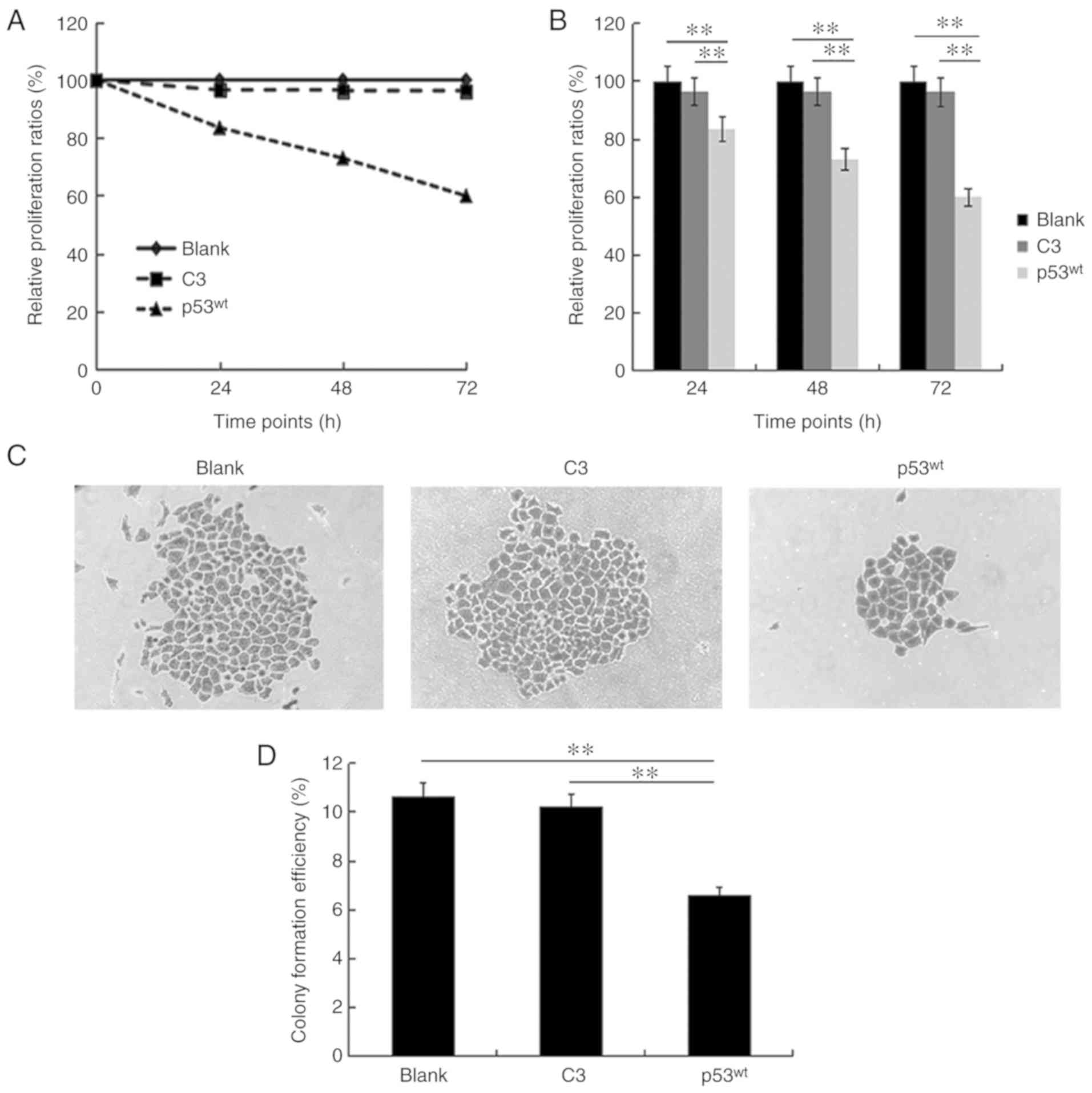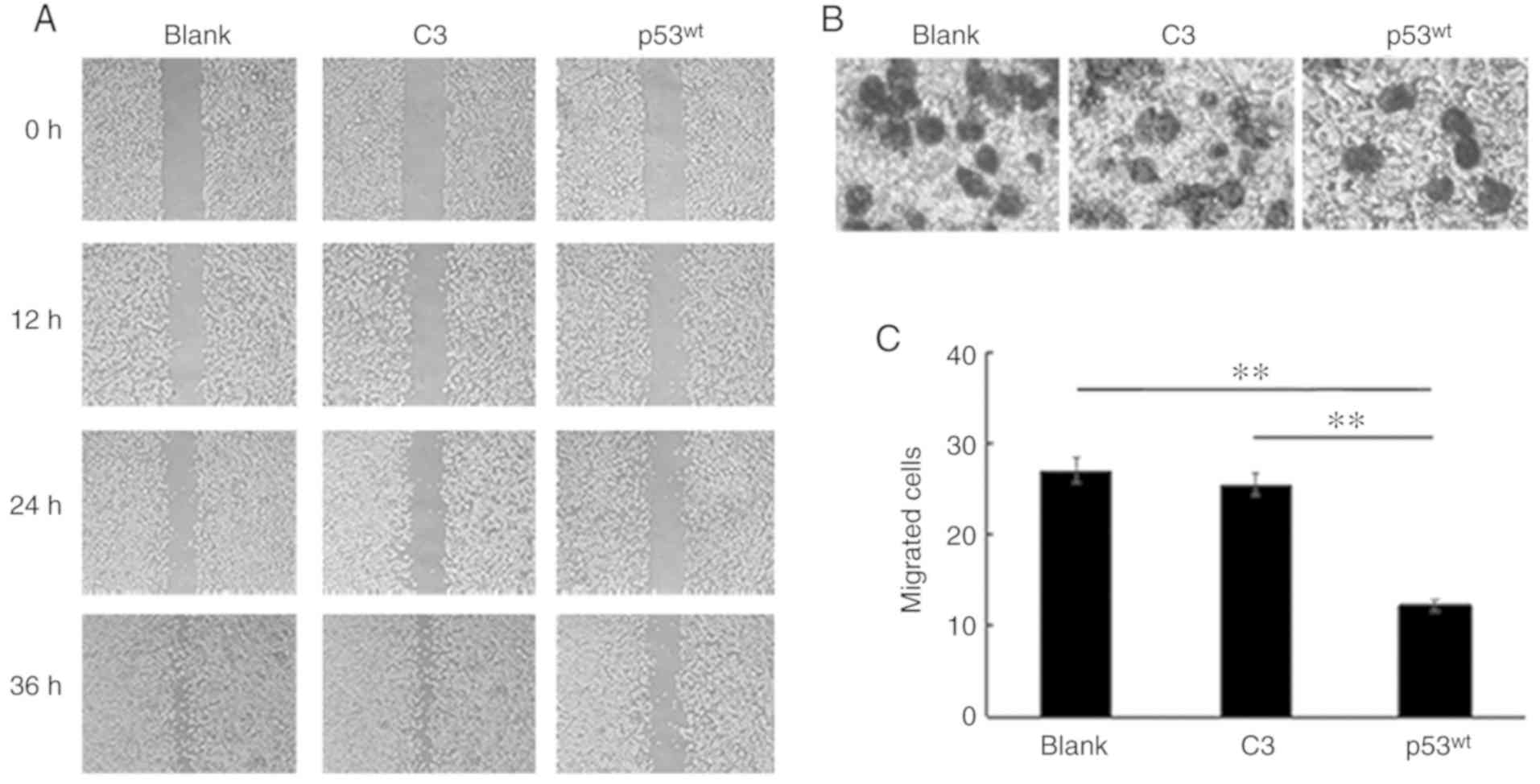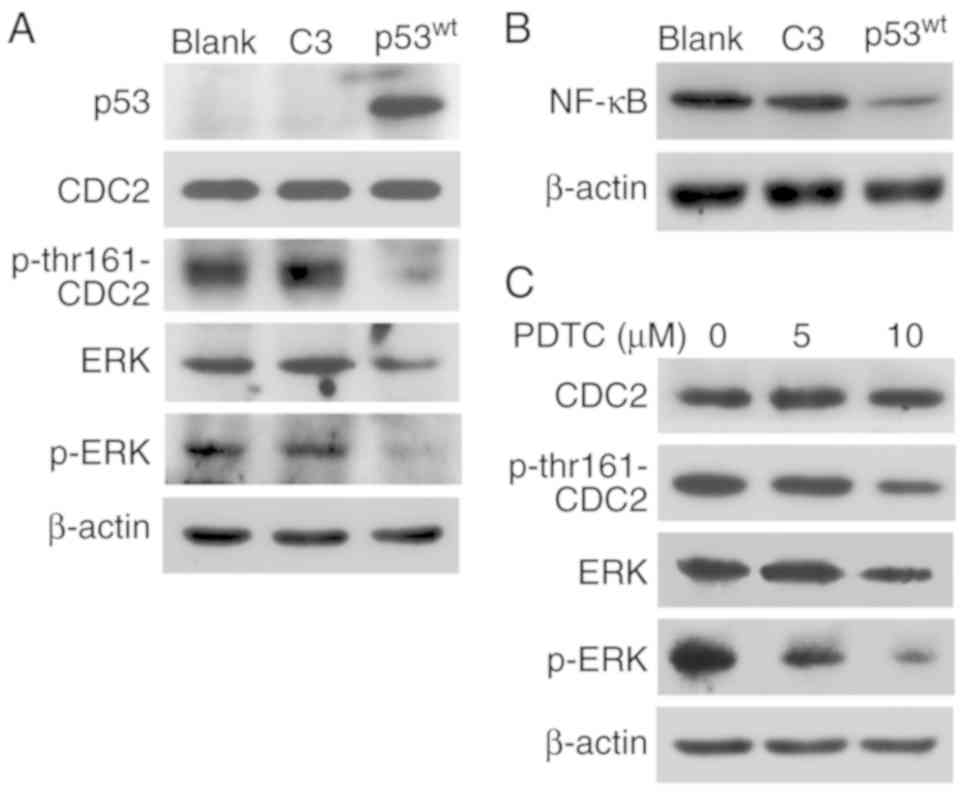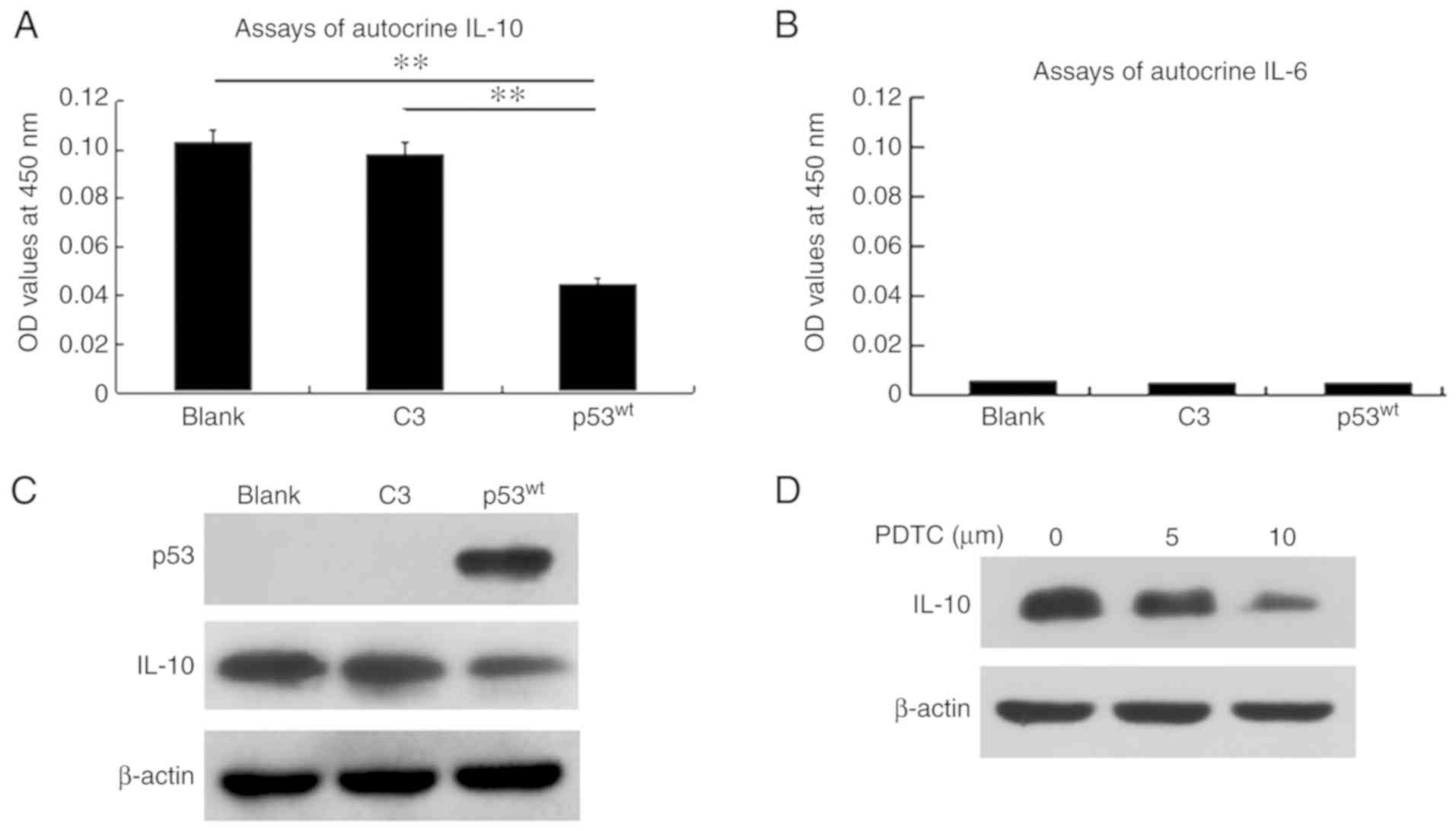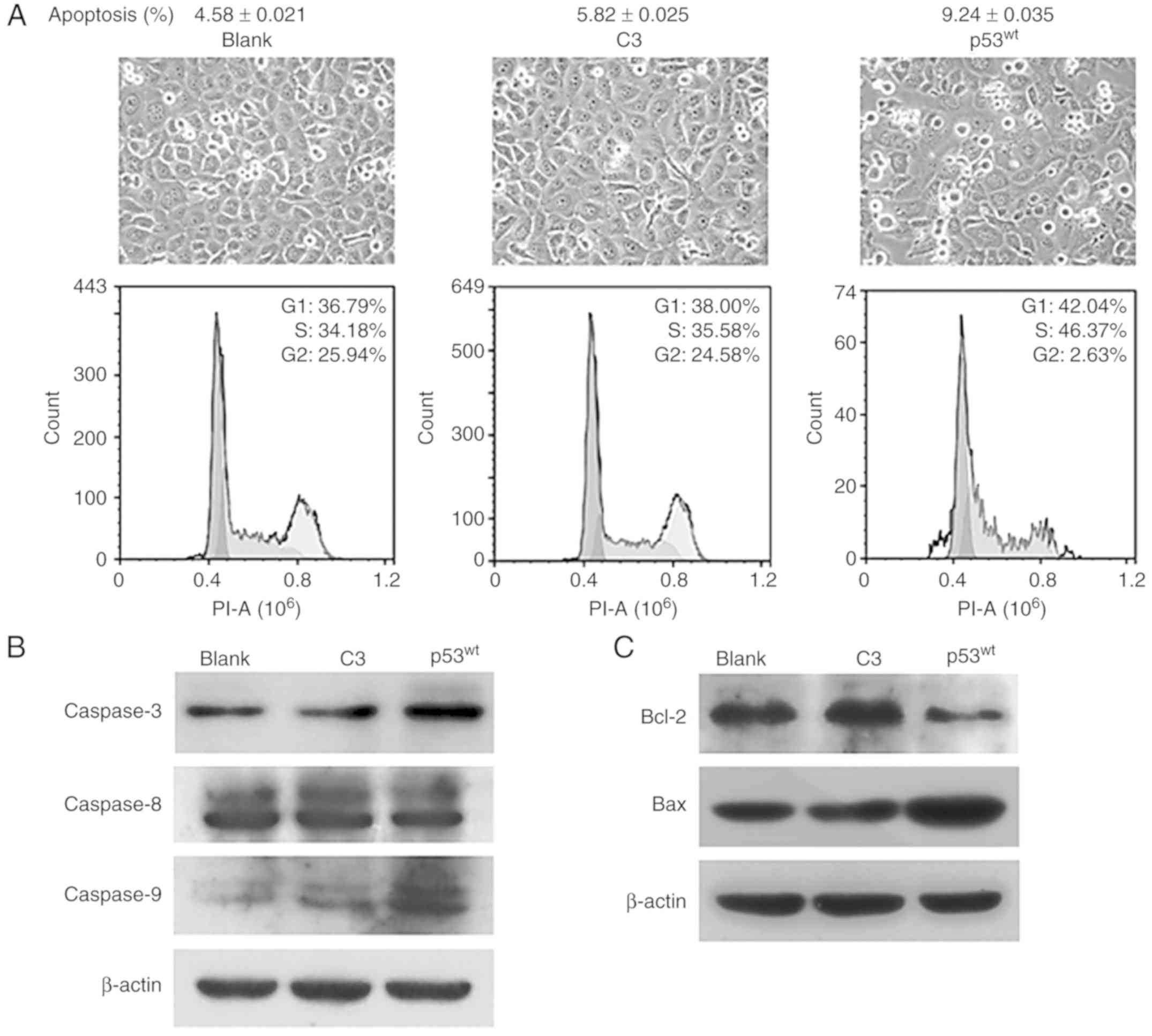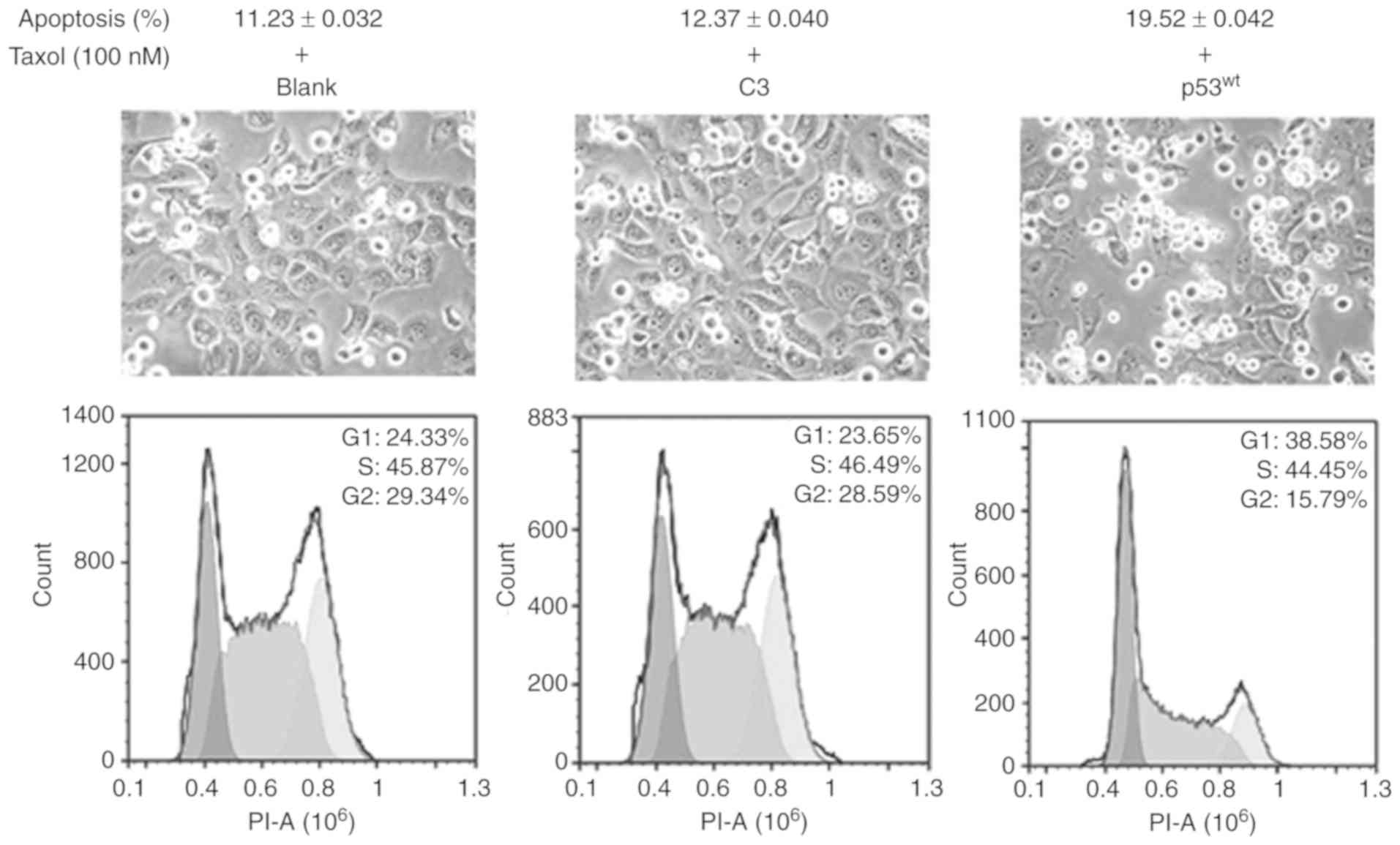|
1
|
Lin X, Liao Y, Yang J, Su L, Zou H and Zuo
Y: Regulation of the drug-resistance of carcinoma cells mediated by
Op18/stathmin. Chem Life. 33:265–268. 2013.
|
|
2
|
Long D, Yu T, Chen X, Liao Y and Lin X:
RNAi targeting STMN alleviates the resistance to taxol and
collectively contributes to down regulate the malignancy of NSCLC
cells in vitro and in vivo. Cell Biol Toxicol. 34:7–21. 2018.
View Article : Google Scholar : PubMed/NCBI
|
|
3
|
Guntur VP, Waldrep JC, Guo JJ, Selting K
and Dhand R: Increasing p53 protein sensitizes non-small cell lung
cancer to paclitaxel and cisplatin in vitro. Anticancer Res.
30:3557–3564. 2010.PubMed/NCBI
|
|
4
|
Lv Y, Huo Y, Yu X, Liu R, Zhang S, Zheng X
and Zhang X: TopBP1 contributes to the chemoresistance in non-small
cell lung cancer through upregulation of p53. Drug Des Devel Ther.
10:3053–3064. 2016. View Article : Google Scholar : PubMed/NCBI
|
|
5
|
Riley T, Sontag E, Chen P and Levine A:
Transcriptional control of human p53-regulated genes. Nat Rev Mol
Cell Biol. 9:402–412. 2008. View
Article : Google Scholar : PubMed/NCBI
|
|
6
|
Matt S and Hofmann TG: The DNA
damage-induced cell death response: A roadmap to kill cancer cells.
Cell Mol Life Sci. 73:2829–2850. 2016. View Article : Google Scholar : PubMed/NCBI
|
|
7
|
Zhang EB, Yin DD, Sun M, Kong R, Liu XH,
You LH, Han L, Xia R, Wang KM, Yang JS, et al: P53-regulated long
non-coding RNA TUG1 affects cell proliferation in human non-small
cell lung cancer, partly through epigenetically regulating HOXB7
expression. Cell Death Dis. 5:e12432014. View Article : Google Scholar : PubMed/NCBI
|
|
8
|
Kracikova M, Akiri G, George A,
Sachidanandam R and Aaronson SA: A threshold mechanism mediates p53
cell fate decision between growth arrest and apoptosis. Cell Death
Differ. 20:576–588. 2013. View Article : Google Scholar : PubMed/NCBI
|
|
9
|
Lin X and Cao Y: Advances in the
regulation of the signals on Op18/stathmin. Life Sci Res.
11:195–199. 2007.
|
|
10
|
Cassimeris L: The oncoprotein 18/stathmin
family of microtubule destabilizers. Curr Opin Cell Biol. 14:18–24.
2002. View Article : Google Scholar : PubMed/NCBI
|
|
11
|
Belletti B and Baldassarre G: Stathmin: A
protein with many tasks. New biomarker and potential target in
cancer. Expert Opin Ther Targets. 15:1249–1266. 2011. View Article : Google Scholar : PubMed/NCBI
|
|
12
|
Johnsen JI, Aurelio ON, Kwaja Z, Jörgensen
GE, Pellegata NS, Plattner R, Stanbridge EJ and Cajot JF:
p53-mediated negative regulation of stathmin/Op18 expression is
associated with G2/M cell-cycle arrest. Int J Cancer.
88:685–691. 2000. View Article : Google Scholar : PubMed/NCBI
|
|
13
|
Bessho R, Matsubara K, Kubota M, Kuwakado
K, Hirota H, Wakazono Y, Lin YW, Okuda A, Kawai M and Nishikomori
R: Pyrrolidine dithiocarbamate, a potent inhibitor of nuclear
factor kappa B (NF-kappa B) activation, prevents apoptosis in human
promyelocytic leukemia HL-60 cells and thymocytes. Biochem
Pharmacol. 48:1883–1889. 1994. View Article : Google Scholar : PubMed/NCBI
|
|
14
|
Shen F, Wu Y and Lin X: The pleiotropic
function of P53. Basic Clin Med. 35:1672–1676. 2015.(In
Chinese).
|
|
15
|
Olive KP, Tuveson DA, Ruhe ZC, Yin B,
Willis NA, Bronson RT, Crowley D and Jacks T: Mutant p53 gain of
function in two mouse models of Li-Fraumeni syndrome. Cell.
119:847–860. 2004. View Article : Google Scholar : PubMed/NCBI
|
|
16
|
Fuster JJ, Sanz-Gonzalez SM, Moll UM and
Andres V: Classic and novel roles of p53: Prospects for anticancer
therapy. Trends Mol Med. 13:192–199. 2007. View Article : Google Scholar : PubMed/NCBI
|
|
17
|
Wilking MJ, Singh C, Nihal M, Zhong W and
Ahmad N: SIRT1 deacetylase is overexpressed in human melanoma and
its small molecule inhibition imparts anti-proliferative response
via p53 activation. Arch Biochem Biophys. 563:94–100. 2014.
View Article : Google Scholar : PubMed/NCBI
|
|
18
|
Liu P, Kao TP and Huang H: CDK1 promotes
cell proliferation and survival via phosphorylation and inhibition
of FOXO1 transcription factor. Oncogene. 27:4733–4744. 2008.
View Article : Google Scholar : PubMed/NCBI
|
|
19
|
Malumbres M and Barbacid M: Cell cycle,
CDKs and cancer: A changing paradigm. Nat Rev Cancer. 9:153–166.
2009. View Article : Google Scholar : PubMed/NCBI
|
|
20
|
Perez de Castro I, de Carcer G and
Malumbres M: A census of mitotic cancer genes: New insights into
tumor cell biology and cancer therapy. Carcinogenesis. 28:899–912.
2007. View Article : Google Scholar : PubMed/NCBI
|
|
21
|
Dhillon AS, Hagan S, Rath O and Kolch W:
MAP kinase signalling pathways in cancer. Oncogene. 26:3279–3290.
2007. View Article : Google Scholar : PubMed/NCBI
|
|
22
|
Wang J and Wu GS: Role of autophagy in
cisplatin resistance in ovarian cancer cells. J Biol Chem.
289:17163–17173. 2014. View Article : Google Scholar : PubMed/NCBI
|
|
23
|
Lin X, Liu S, Luo X, Ma X, Guo L, Li L, Li
Z, Tao Y and Cao Y: EBV-encoded LMP1 regulates Op18/stathmin
signaling pathway by cdc2 mediation in nasopharyngeal carcinoma
cells. Int J Cancer. 124:1020–1027. 2009. View Article : Google Scholar : PubMed/NCBI
|
|
24
|
Lin X, Tang M, Tao Y, Li L, Liu S, Guo L,
Li Z, Ma X, Xu J and Cao Y: Epstein-Barr virus-encoded LMP1
triggers regulation of the ERK-mediated Op18/stathmin signaling
pathway in association with cell cycle. Cancer Sci. 103:993–999.
2012. View Article : Google Scholar : PubMed/NCBI
|
|
25
|
Chen X, Liao Y, Long D, Yu T, Shen F and
Lin X: The Cdc2/Cdk1 inhibitor, purvalanol A, enhances the
cytotoxic effects of taxol through Op18/stathmin in non-small cell
lung cancer cells in vitro. Int J Mol Med. 40:235–242. 2017.
View Article : Google Scholar : PubMed/NCBI
|
|
26
|
Lin X, Liao Y, Chen X, Long D, Yu T and
Shen F: Regulation of oncoprotein 18/stathmin signaling by ERK
concerns the resistance to taxol in nonsmall cell lung cancer
cells. Cancer Biother Radiopharm. 31:37–43. 2016. View Article : Google Scholar : PubMed/NCBI
|
|
27
|
Huan L, Bao C, Chen D, Li Y, Lian J, Ding
J, Huang S, Liang L and He X: MicroRNA-127-5p targets the
biliverdin reductase B/nuclear factor-κB pathway to suppress cell
growth in hepatocellular carcinoma cells. Cancer Sci. 107:258–266.
2016. View Article : Google Scholar : PubMed/NCBI
|
|
28
|
Lu Y, Liu C, Cheng H, Xu Y, Jiang J, Xu J,
Long J, Liu L and Yu X: Stathmin, interacting with Nf-κB, promotes
tumor growth and predicts poor prognosis of pancreatic cancer. Curr
Mol Med. 14:328–339. 2014. View Article : Google Scholar : PubMed/NCBI
|
|
29
|
Incrocci R, Barse L, Stone A, Vagvala S,
Montesano M, Subramaniam V and Swanson-Mungerson M: Epstein-barr
virus latent membrane protein 2A (LMP2A) enhances IL-10 production
through the activation of Bruton's tyrosine kinase and STAT3.
Virology. 500:96–112. 2017. View Article : Google Scholar : PubMed/NCBI
|
|
30
|
Kawaratani H, Moriya K, Namisaki T, Uejima
M, Kitade M, Takeda K, Okura Y, Kaji K, Takaya H, Nishimura N, et
al: Therapeutic strategies for alcoholic liver disease: Focusing on
inflammation and fibrosis (Review). Int J Mol Med. 40:263–270.
2017. View Article : Google Scholar : PubMed/NCBI
|
|
31
|
Shan Y, He X, Song W, Han D, Niu J and
Wang J: Role of IL-6 in the invasiveness and prognosis of glioma.
Int J Clin Exp Med. 8:9114–9120. 2015.PubMed/NCBI
|
|
32
|
Zhang M, Gong W, Zhang Y, Yang Y, Zhou D,
Weng M, Qin Y, Jiang A, Ma F and Quan Z: Expression of
interleukin-6 is associated with epithelial-mesenchymal transition
and survival rates in gallbladder cancer. Mol Med Rep.
11:3539–3546. 2015. View Article : Google Scholar : PubMed/NCBI
|
|
33
|
Olsen J, Kirkeby LT, Olsen J, Eiholm S,
Jess P, Gögenur I and Troelsen JT: High interleukin-6 mRNA
expression is a predictor of relapse in colon cancer. Anticancer
Res. 35:2235–2240. 2015.PubMed/NCBI
|
|
34
|
Mittal SK and Roche PA: Suppression of
antigen presentation by IL-10. Curr Opin Immunol. 34:22–27. 2015.
View Article : Google Scholar : PubMed/NCBI
|
|
35
|
Klumpp D, Misovic M, Szteyn K, Shumilina
E, Rudner J and Huber SM: Targeting TRPM2 channels impairs
radiation-induced cell cycle arrest and fosters cell death of T
cell leukemia cells in a Bcl-2-dependent manner. Oxid Med Cell
Longev 2016. 80267022016.
|
|
36
|
Veena VK, Kennedy K, Lakshmi P, Krishna R
and Sakthivel N: Anti-leukemic, anti-lung, and anti-breast cancer
potential of the microbial polyketide 2,4-diacetylphloroglucinol
(DAPG) and its interaction with the metastatic proteins than the
antiapoptotic Bcl-2 proteins. Mol Cell Biochem. 414:47–56. 2016.
View Article : Google Scholar : PubMed/NCBI
|
|
37
|
Oyaizu H, Adachi Y, Okumura T, Okigaki M,
Oyaizu N, Taketani S, Ikebukuro K, Fukuhara S and Ikehara S:
Proteasome inhibitor 1 enhances paclitaxel-induced apoptosis in
human lung adenocarcinoma cell line. Oncol Rep. 8:825–829.
2001.PubMed/NCBI
|
















